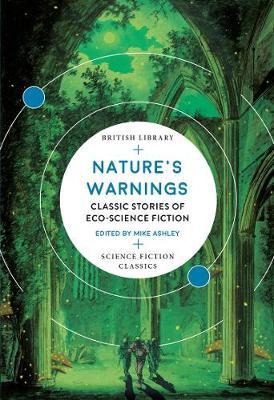
Science Fiction has always been concerned about the future. Over a 100 years ago, SF stories appeared that warned us that our planet was in danger. The most recognized story in this anthology is Alfred Bester’s classic, “Adam and No Eve.”
I also was familiar with Philip K. Dick’s “Survey Team” and Clifford D. Simak’s “Drop Dead” stories before I read Nature’s Warnings. I was surprised by Jack Sharkey’s “A Matter of Protocol,” a story I must have read in GALAXY in 1962 and then completely forgot about. It was great to re-read it. Richard McKenna is an underrated writer, but “Hunter, Come Home” shows why he should be better known. This story about a planet defending itself from humans is both moving and cautionary.
Elisabeth Sanxay Holding is best known for her mysteries, but “Shadow of Wings” shows she could create dread in SF stories, too. Margaret St. Clair’s “The Gardener” displays her talents as a gifted short story writer.
As with all these anthologies in The British Library Science Fiction series, Mike Ashley provides informative introductions and insights for each story. You can’t go wrong with a Mike Ashley anthology! GRADE: B+
TABLE OF CONTENTS:
INTRODUCTION by Mike Ashley
- Survey Team • (1954) • short story by Philip K. Dick
- The Dust of Death • [The Doom of London] • (1903) • short story by Fred M. White
- The Man Who Hated Flies • (1929) • short fiction by J. D. Beresford
- The Man Who Awoke • [The Man Who Awoke • • (1933) • novelette by Laurence Manning
- The Sterile Planet • novelette by Nat Schachner (variant of Sterile Planet (1937) [as by Nathan Schachner]
- Shadow of Wings • (1954) short fiction by Elisabeth Sanxay Holding [as by Elizabeth Sanxay Holding]
- The Gardener • (1949) • short story by Margaret St. Clair
- Drop Dead • (1956) • novelette by Clifford D. Simak
- A Matter of Protocol • [Contact] • (1962) • short story by Jack Sharkey
- Hunter, Come Home • (1963) • novelette by Richard McKenna
- Adam and No Eve • (1941) • short story by Alfred Bester
I agree. The Ashley anthologies I’ve read have all been worthwhile, and a quick check of Amazon shows quite a few others.
Jeff, I’ve reviewed a handful of Ashley’s BRITISH LIBRARY series books, but there are more in the pipeline. For a historical and thematic approach to Science Fiction–with an emphasis on more obscure British SF–this series can’t be beat!
Bester’s story is the only one here I specifically remember but I’ve read so many Philip Dick stories that I’ve probably read “Survey Team”. I did read a couple of decent mystery novels by Holding but didn’t know she’d written short stories or SF.
Michael, the inclusion of the Holding story demonstrates why I enjoy Mike Ashley anthologies. He includes some surprises in every volume!
Holding did indeed write short fiction, and between them Anthony Boucher at F&SF and with a slight crossover Hans Stefan Santesson at FANTASTIC UNIVERSE (while he was also editing THE SAINT magazine, a kind of follower-around of EQMM much as FU was of F&SF), and of course Robert Mills succeeding Boucher at F&SF all convinced, invited and encouraged crime-fiction writers to try sf and fantasy, or at very least wanted to see their attempts. (George gave you the links to ISFDB, where you will find this story first appeared in F&SF in the Boucher years.)
I’m more familiar with the British Library Crime Classics series, edited by Martin Edwards. I’ve long thought the Dick story was very depressing.
Rick, you would find most of the stories in NATURE’S WARNINGS depressing. The planet is in trouble and not much is being done to save it.
Stories depressing?
Almost as in real life …
Though I’ve probably written and enjoyed some of these stories, I found the novels on the destruction of Earth or at least mankind /more moving.
Nevil Shute’s On the Beach eg or Vonnegut’s Cat Cadle with Ice-9.
Wolf, I was taken with Vonnegut’s ICE-9 when I first read CAT’S CRADLE.
Wolf, I’ve been thinking recently of rereading “On the Beach”. I loved it when I read it in high school. Loved the movie too.
Michael, ON THE BEACH is a very underrated novel.
Yes, the movie moved my friends and me to tears.
But of course growing up during the cold war and knowing a bit of physics and the consequences of nuclear bombs …
I probably have written about this before:
In the beginning of the 1960s as a student I “worked” some weekends for the German civil defense and participated in some of the NATO military exercises like Fallex or Wintex and had to calculate (based on simulated NATO measurements with Geiger counters etc) how many hours/days/weeks a city should not be entered that had been hit by an A-bomb or H-bomb and then tell people via emergency radio.
And of course we knew that people present in the neighbourhood during an explosion had no chance to survive.
Unbelievable!
Wolf, and I don’t even want to think about the devastation caused by Chernobyl!
The first thing I read by Bester…a slightly off-topic story for this book (at least in terms of the incidental nature of the stupid self-destruction), but it does end on what could be considered in certain ways a happy note…certainly made an impression on very young me.
McKenna got to be Very well-known, of course, for THE SAND PEBBLES, his (then) near-past historical/partially autobiographical novel, and then his chronic illness caught up with him. More tragically cut short, kind of like Michael Shaara, with another twenty years piled on…we’ll see how THE KILLER ANGELS is doing in another couple of decades, maybe.
Todd, you’re right about McKenna and Shaara: their lives were cut short. I still think people will be reading THE KILLER ANGELS and THE SAND PEBBLES 20 years from now.